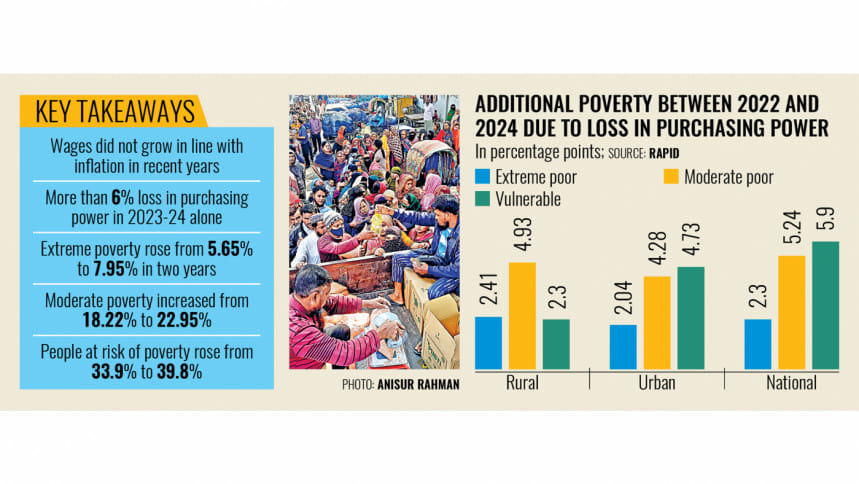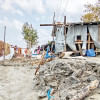High inflation sent another 78 lakh into poverty in past two years

Over the past two years, real income reductions due to ongoing inflationary pressure have pushed at least 78 lakh people into poverty, shows the study by the Research and Policy Integration for Development (RAPID).
This includes 38 lakh people who have become extremely poor.
Besides, around 1 crore more are at risk of slipping below the poverty line due to continued inflationary pressures, said Md Deen Islam, research director of the RAPID.
At a workshop at CIRDAP auditorium in the capital yesterday, Islam said ongoing policy tightening should be complemented with contractionary fiscal adjustments to win the battle against the brutal price pressures weighing on Bangladesh for around two years.
The country has been experiencing over 9 percent inflation since March last year.
Price pressures rose to a three-month high of 11.38 percent in November, higher than 10.87 percent in October, owing to the soaring prices of foods, especially the staple rice and vegetables.
Annual average consumer prices stood at 10.22 percent in November, up from 10.04 percent a month ago, according to official data.
While presenting the keynote at the workshop titled "Macroeconomic Situation and LDC (least developed countries) Graduation", Islam said the percentage of extreme poverty rate increased to 7.95 percent from 5.65 percent in the last two years.
The World Bank (WB) defines extreme poverty based on an international poverty income of $2.15 a day.
In April this year, the WB said weak private consumption growth and high inflation have halted poverty reduction in Bangladesh.
Islam said the percentage of people at risk of falling into poverty increased to 39.8 percent from 33.9 percent in the past two years, due mainly to ongoing high inflation.
Regarding solutions, he said Bangladesh has started implementing a contractionary monetary policy by raising the policy rate to an all-time high of 10 percent.
However, the monetary tightening needs to be combined with other contractionary fiscal adjustments to get inflation under control, he said.
Islam also said the increase in the policy rate needs to be complemented by stopping the printing of new money and limiting the flow of money to the market, as well as lowering the budget deficit.
Citing economic turbulence due to inflationary pressures in Sri Lanka and Pakistan, he advocated for a long-term monetary policy rather than short-term fluctuations.
Besides, the workshop discussed rearranging budget allocations to shore up the fight against poverty.
About revising the budget of the current fiscal year, M Abu Eusuf, executive director of the RAPID, said just a 2.3 percent reallocation of annual development spending could help double the funds required for three major food-based social protection programmes.
He also said given the current economic stress and past implementation records, slow development spending is not a surprise.
But a clear policy direction should be urgently provided to reallocate development spending to tackle the rising cost of living, he said.
According to him, an 8 percent reallocation of annual development programme (ADP) spending would help double the funds for nine critical social protection programmes for the vulnerable.
In another presentation on "LDC Graduation: Urgency of Preparation for a Smooth Transition, Regardless of Timeline Extension", RAPID Chairman MA Razzaque stressed on the need for prioritisation of transition measures.
Bangladesh is set to make the United Nations country status graduation from a least developed country (LDC) to a developing one in 2026.
According to Razzaque, Bangladesh has already fulfilled the three criteria for the LDC graduation and there is no specific benefit to delaying the graduation rather than finding alternative facilities for a smooth transition.
The government needs to apply for delaying the graduation to the United Nations (UN) with proper evidence, otherwise the UN will not accept the application, he said.
Regarding the middle-income trap, he said until now, only 19 countries could shift into becoming high-income countries from developing countries.
So, Bangladesh needs to find a way to increase its income and escape from the middle-income status, he said.
Razzaque said a country with a per capita income between $4,000 and $14,000 should consider moving to a high-income status.

 For all latest news, follow The Daily Star's Google News channel.
For all latest news, follow The Daily Star's Google News channel. 








Comments